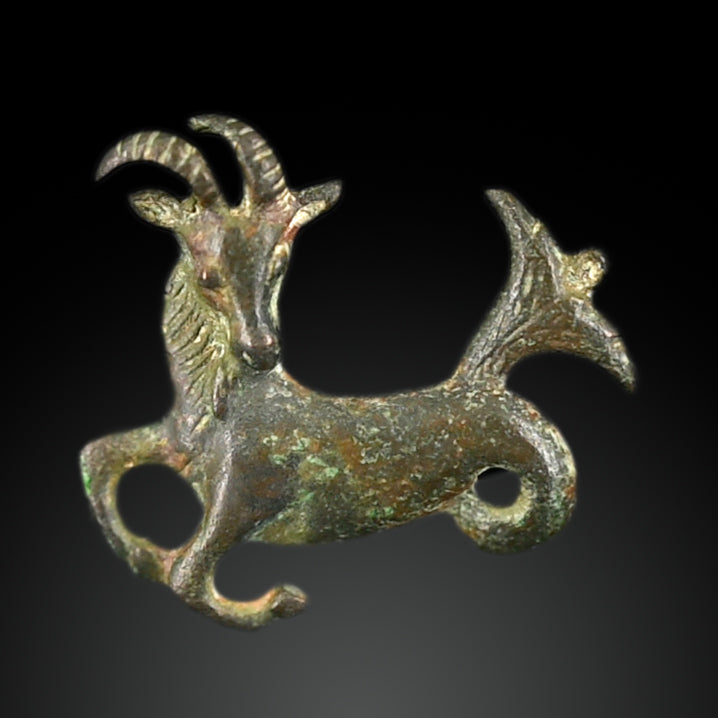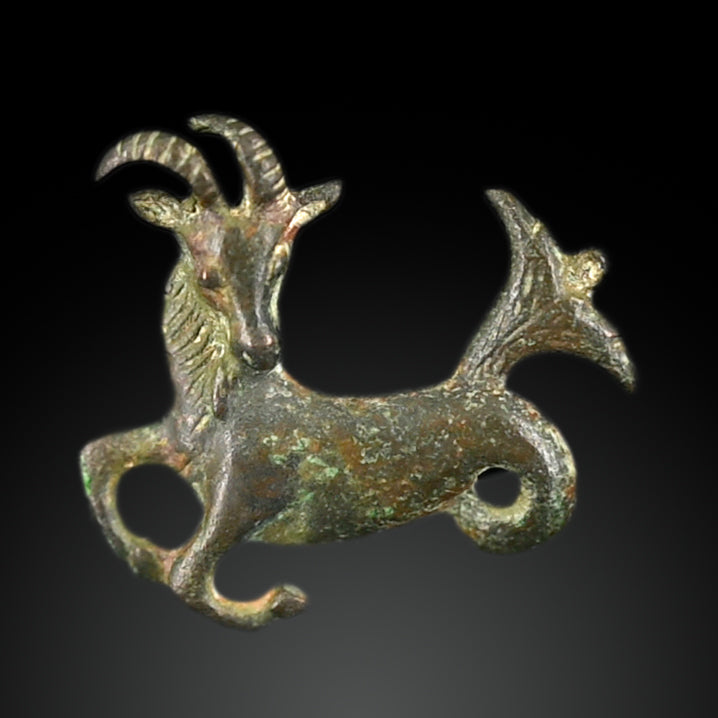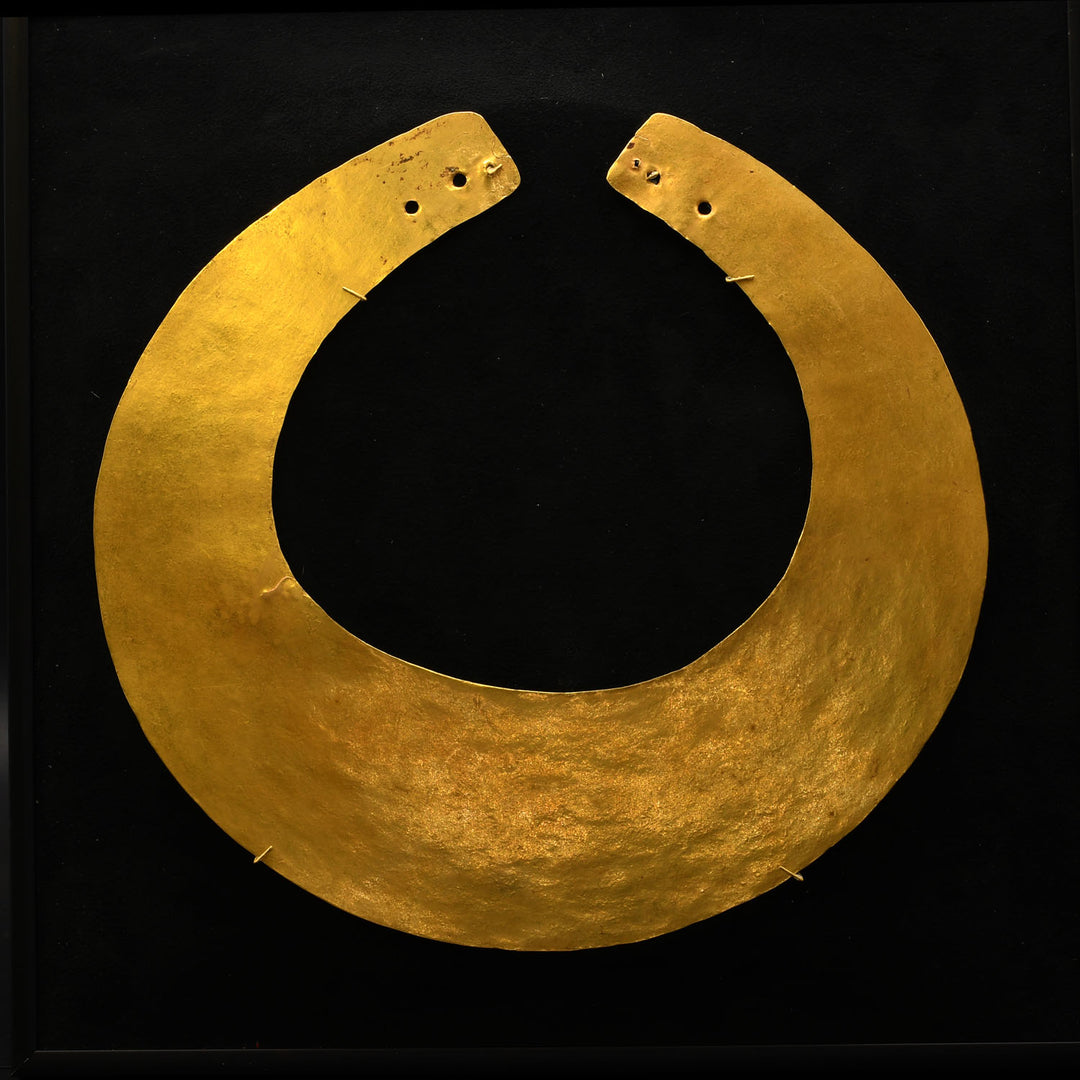A Roman Imperatorial Julius Caesar Silver Denarius Pendant, Roman Republic, April-August 49 BCE
RJ2413
- Dieses Objekt ist für den kostenlosen Versand in die USA und für den internationalen Versand gegen eine Pauschalgebühr von 60 $ qualifiziert.
This famous denarius was struck by Julius Caesar soon after he triggered the Great Roman Civil War. Caesar probably struck this marvel of self-promotion in mid-49 BC, a crossroads in ancient history.
After crossing the Rubicon, Caesar entered a deserted Rome and addressed the remaining Senators. With his growing political power and extraordinary charisma, he obtained large amounts of public precious metals. The silver and gold were used to mint coins, including the elephant denarius, the first coin directly associated with Caesar's side during the civil war. These coins were minted by Caesar's military without formal Senate approval to showcase his achievements and his opponents' shortcomings.
The obverse depicts religious implements associated with Caesar's office of Pontifex Maximus: a culullus (a ritual cap), an aspergillum (a brush used to sprinkle holy water), a securis (a single-bladed, double-handed, and animal-headed axe), and a simpulum (a long-handled ladle used at sacrifices, for example, to share libations). These symbols emphasized Caesar's religious post and provided a reminder of his claimed relationship with the gods.
The verso portrays an elephant facing right, with its trunk defiantly raised upwards, about to trample what appears to be a horned serpent, and, in exergue, the simple yet striking legend of CAESAR. This extraordinary imagery (the only instance Caesar employed an elephant) still draws attention today, the subject of intense debate among historians and numismatists alike. Interpretations of the imagery vary widely, from symbolizing good triumphing over evil to being a clever wordplay on the Punic term for elephant (pachyderm). However, the most compelling explanation suggests that Caesar used the elephant as a clever attack against his political opponents, especially Gnaeus Pompeius Magnus, also known as Pompey the Great.
The elephant motif was used on earlier Roman Republican and Hellenistic coinage. The large and powerful elephant had become associated with Alexander the Great, even though he didn't use them in battle. Pompey, aiming to be compared to Alexander, also associated himself with elephants. During his first Triumph in 81 BC, Pompey tried to impress the populace by driving his elephant-drawn chariot through Rome's gates. Unfortunately, the entrance was not large enough, forcing him to improvise a more mundane entrance. Pompey also used elephants in extravagant games to open his theater in 55 BC, but this only made the crowd sympathize with the exploited animals, which worked against him. Caesar knew this, of course, as he strove to promote himself above his ally-turned-enemy. Therefore, it is not unreasonable to theorize that Caesar's elephant denarius was intended to mock Pompey.
There are various theories about the meaning of the snake, including the idea that it represents a symbolic battle between good and evil. Some Romans believed that snakes and elephants were natural enemies. For example, Pliny the Elder told a story about a never-ending conflict between them, where the snake eventually kills the elephant, only to be crushed by the falling body of its foe.
While it's unclear what Caesar meant by using these animals, it's possible that he was referencing this ancient rivalry and identifying himself with the elephant, the dominant figure on the coin. Interestingly, the coin shows the moment before the battle, leaving the outcome uncertain, much like the Great Roman Civil War itself. Caesar's ultimate fate, famously murdered by enemies nervous of his powers, parallels Pliny's outcome for the serpent, rather than the elephant.
See: "Turning Points in Roman History: The Case of Caesar's Elephant Denarius," D. L. Nousek, Phoenix, 2008, 62:290-307.
ROMAN IMPERATORIAL, Julius Caesar, April-August 49 BC, AR Denarius Military mint traveling with Caesar, and set as a pendant within a modern handmade circular sterling silver setting. References: Crawford 443/1; CRI 9; Sydenham 1006; RSC 49.
Medium: Silver
Dimensions: Length: 1.4 ins (3.5cm) Width: 3/4 in (2.0 cm)
Condition: Very fine, toned, minor porosity. Set as a pendant necklace of sterling silver.
Provenance: Private British collection assembled in the 1980s, thereafter private collection of an important London jewelry collector.
Sands of Time bietet eine lebenslange, bedingungslose Garantie für Authentizität und Herkunft. Jedem Objekt, das Sie bei uns kaufen, liegt ein Echtheitszertifikat bei, aus dem Kultur, Herkunft und Alter hervorgehen.
Darüber hinaus führen wir eine sorgfältige Prüfung durch, um sicherzustellen, dass der Gegenstand nach unserem besten Wissen nicht illegal aus einer Ausgrabung, einem Baudenkmal, einer öffentlichen Einrichtung oder einem Privatgrundstück stammt. Wo immer möglich, wird auf bestehende Sammlungen oder Veröffentlichungen verwiesen.Wo immer möglich, wird auf bestehende Sammlungen oder Veröffentlichungen verwiesen.
Wir versenden dienstags bis freitags mit FedEx und in der Regel noch am selben Tag, wenn Ihre Bestellung vor 14:00 Uhr eingeht. Innerhalb der kontinentalen USA sind Verpackung, Versand und Versicherung kostenlos. Je nach Größe und Zielort betragen die Lieferzeiten zwischen einem und fünf Werktagen.
Für Auslandssendungen berechnen wir eine geringe Pauschalgebühr, die Verpackung, Vorbereitung aller Zollpapiere, Versicherung und Spediteurgebühren gemäß allen US-amerikanischen und internationalen Zollbestimmungen umfasst. Sendungen ins Ausland werden entweder mit USPS Priority Mail oder FedEx verschickt, kontaktieren Sie uns jedoch, wenn Sie eine Versandpräferenz haben. Internationale Kunden sind für alle Zölle und Steuern verantwortlich.




















